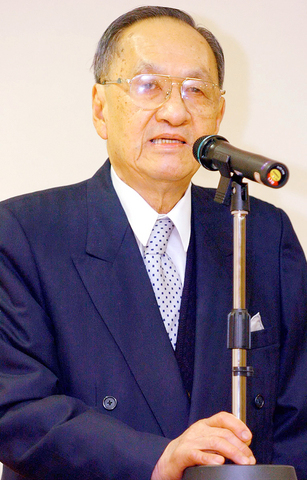At the heart of the controversy over President Chen Shui-bian's (陳水扁) proposal to scrap the National Unification Council and unification guidelines are the pledges made by Chen in his first inaugural address. Many feel that in making the pledges, Chen created more problems for himself than he resolved.
Vice President Annette Lu (
She also claimed that the precondition did not exist when the pledges were made.

PHOTO: CHANG CHIA-MING, TAIPEI TIMES
Chen promised that as long as Beijing had no intention of using military force against Taiwan, he would not declare independence, change the national title, enshrine the "state-to-state" model of cross-strait relations in the Constitution or hold a referendum on independence or unification.
Chen's final pledge was that abolishing the NUC and unification guidelines "would not be an issue."
Peng Ming-min (
"He has lost a lot of supporters because of that," Peng said.
Peng, however, said that he believes there are complex reasons for why Chen did so. He also believes that Chen was well aware that he would run the risk of losing support by making the pledge.
Chen was later criticized for agreeing to discuss the issue of "one China." Beijing, however, insisted on setting that as the precondition for the resumption of cross-strait talks.
As the US government has expressed the hope that Chen will reiterate the pledges, Peng said that he wonders why the US did not strongly condemn China's Anti-Secession Law, the enactment of which he sees as more serious than doing away with the unification council and guidelines.
Peng said that he cannot be certain whether Chen will reiterate the pledge, but that the US government must realize that the premise of the pledges no longer exists, as the status quo in the Taiwan Strait is dynamic, rather than static.
"US Secretary of Defense Donald Rumsfeld once said that China is the only country in the world that is not threatened by any other country," Peng said. "It makes me wonder why China keeps making double-digit increases in its military budget each year. The answer is simple and clear: they want to make themselves so strong that the US won't be able to interfere in whatever happens in the Taiwan Strait. When China is ready, the first thing they will do is change the status quo."

Taiwan has received more than US$70 million in royalties as of the end of last year from developing the F-16V jet as countries worldwide purchase or upgrade to this popular model, government and military officials said on Saturday. Taiwan funded the development of the F-16V jet and ended up the sole investor as other countries withdrew from the program. Now the F-16V is increasingly popular and countries must pay Taiwan a percentage in royalties when they purchase new F-16V aircraft or upgrade older F-16 models. The next five years are expected to be the peak for these royalties, with Taiwan potentially earning

STAY IN YOUR LANE: As the US and Israel attack Iran, the ministry has warned China not to overstep by including Taiwanese citizens in its evacuation orders The Ministry of Foreign Affairs (MOFA) yesterday rebuked a statement by China’s embassy in Israel that it would evacuate Taiwanese holders of Chinese travel documents from Israel amid the latter’s escalating conflict with Iran. Tensions have risen across the Middle East in the wake of US and Israeli airstrikes on Iran beginning Saturday. China subsequently issued an evacuation notice for its citizens. In a news release, the Chinese embassy in Israel said holders of “Taiwan compatriot permits (台胞證)” issued to Taiwanese nationals by Chinese authorities for travel to China — could register for evacuation to Egypt. In Taipei, the ministry yesterday said Taiwan

Taiwan is awaiting official notification from the US regarding the status of the Agreement on Reciprocal Trade (ART) after the US Supreme Court ruled US President Donald Trump's global tariffs unconstitutional. Speaking to reporters before a legislative hearing today, Premier Cho Jung-tai (卓榮泰) said that Taiwan's negotiation team remains focused on ensuring that the bilateral trade deal remains intact despite the legal challenge to Trump's tariff policy. "The US has pledged to notify its trade partners once the subsequent administrative and legal processes are finalized, and that certainly includes Taiwan," Cho said when asked about opposition parties’ doubts that the ART was

If China chose to invade Taiwan tomorrow, it would only have to sever three undersea fiber-optic cable clusters to cause a data blackout, Jason Hsu (許毓仁), a senior fellow at the Hudson Institute and former Chinese Nationalist Party (KMT) legislator, told a US security panel yesterday. In a Taiwan contingency, cable disruption would be one of the earliest preinvasion actions and the signal that escalation had begun, he said, adding that Taiwan’s current cable repair capabilities are insufficient. The US-China Economic and Security Review Commission (USCC) yesterday held a hearing on US-China Competition Under the Sea, with Hsu speaking on